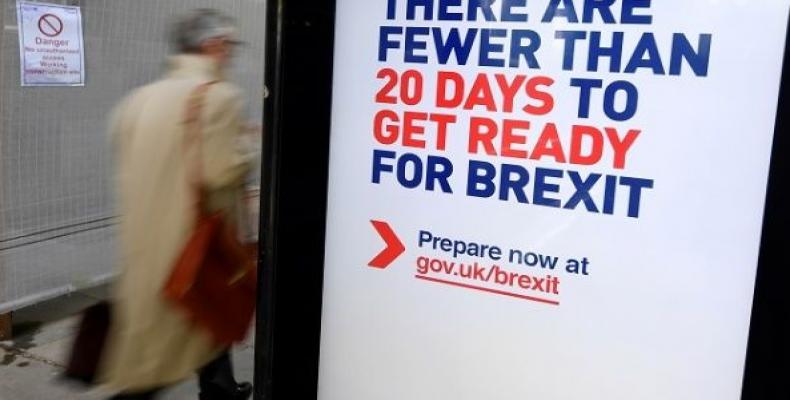London, October 16 (RHC)-- Negotiators struggled Wednesday to clinch an eleventh-hour Brexit deal on the eve of an EU summit, raising the chances that Prime Minister Boris Johnson will have to seek an extension of the October 31st deadline for Britain’s exit from the bloc.
Talks in Brussels Tuesday between European Union and British officials ran into the night and resumed just hours later, but Irish Prime Minister Leo Varadkar said there were still “many issues” to be resolved.
Although differences over the complex divorce between the world’s fifth-largest economy and its biggest trading bloc have narrowed significantly, EU sources reported Wednesday that the two sides had reached a “standstill.”
This was partly because of objections to a proposal on customs from a small Northern Ireland political party whose votes Johnson will likely need to get a Brexit deal through parliament. The main sticking point in the long-running talks with Brussels over Brexit, which has already been delayed twice, is the border between EU member Ireland and the British province of Northern Ireland.
The question is how to prevent the frontier from becoming a backdoor into the EU’s single market without erecting controls which could undermine the 1998 peace agreement that ended decades of conflict in the province.
London’s latest proposal envisages Northern Ireland staying in the UK customs area. Tariffs would apply on goods crossing from mainland Britain to Northern Ireland if they were deemed to be headed further, to Ireland and the bloc’s single market.
Any approval by European Union leaders at their Thursday-Friday summit in Brussels of a last-minute Brexit deal could only be conditional on the British House of Commons approving it later, said three diplomats with the bloc.
If Johnson is to get a deal through parliament, where he does not have a majority, he is likely to need the support of the Northern Irish Democratic Unionist Party (DUP), which says maintaining the economic integrity of the United Kingdom is sacrosanct.
Pro-Brexit lawmakers from Johnson’s governing Conservative Party say they will only back deal if it has gained the support of the DUP, which fears Northern Ireland could be left behind in the EU’s orbit when Britain leaves.
Officials in London described the demands of the three different parties -- the EU, Conservative Brexit supporters, and the DUP -- as trying fit together the pieces of a jigsaw puzzle. Johnson held talks with the DUP and pro-Brexit Conservatives Tuesday and was expected to do so again Wednesday, trying to find a way to soothe their concerns over any compromise he offers to the EU to try to secure a deal.
A central figure in the 2016 referendum who came to power as leader of the Conservative Party in July, Johnson has pledged to take Britain out of the EU on Oct. 31 with or without a deal. But parliament has passed a law saying Britain cannot leave without an agreement, and Johnson has not explained how he can get around that.
Ireland’s Varadkar said in a speech that if the remaining issues cannot be resolved before this week’s EU summit, there was still time left to act before the deadline. “October 31 is still a few weeks away and there is the possibility of an additional summit before that if we need one ... Although time is running short, I am confident that (Ireland’s) objectives can be met,” he said.
EU diplomats said negotiators in Brussels were at odds over Britain’s application of common EU rules and standards designed to ensure fair competition - known as the ‘level playing field’ - and a future trade deal between Britain and the EU.
“The UK wants us to legally commit to sealing a free trade agreement with them in the future that would be tariff-free and quota-free. But we can’t do that, it would be prejudging the future negotiations and tying our hands,” one diplomat said. “So it’s a bit of a standstill at the moment.”
Britain’s Brexit minister, Steve Barclay, said he would not accept a Brexit delay beyond Oct. 31, even if it was only used to tie up the necessary legal requirements of an agreement. Barring a last-minute agreement at the summit, the EU believes Britain will have to delay its departure once again. Extension options range from an additional month beyond Oct. 31 to half a year or more.
The bloc may hold an emergency summit later in October to either approve a deal, grant an extension or make final preparations for a chaotic split.


